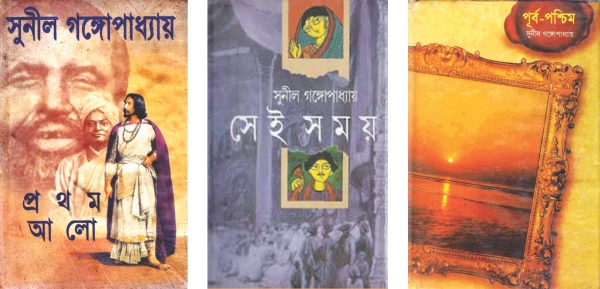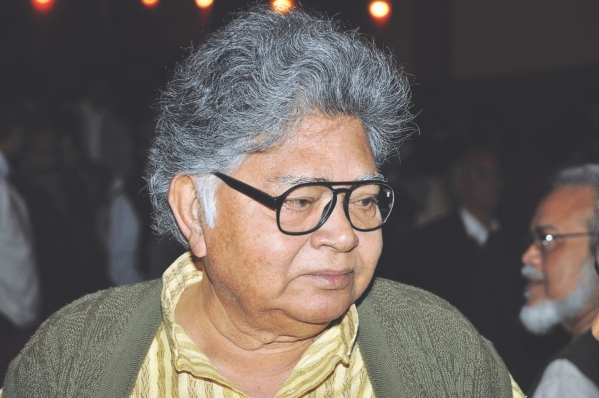| Home - Back Issues - The Team - Contact Us |
 |
| Volume 11 |Issue 43| November 02, 2012 | |
|
|
Tribute Sunil Gangopadhyay An Ardent Lover of Bengali Literature Takir Hossain
"One of the most significant chapters of my life was spent in this country, in the district of Faridpur. That's one of the prime reasons behind my tremendous fascination for the country," Sunil Gangopadhyay once said in an interview. "I feel that I have a strong readership in this country because the contents of my novels have great similarities with the country's socio-economic, cultural and political aspects,” he added. It was at a dinner in the Dhaka Club in 2007 that I met him. Kobita Sankranti, a cultural organisation, was the host of the dinner. The organisation gave him a reception in the evening at the VIP Lounge of the National Press Club. Poet and architect Rabiul Husain introduced me to him. Although the he spoke to me warmly, the venue was a little bit crowded and I did not get the chance to talk to him properly. Fortunately, just two days later, I had another chance to meet him at the renowned architect Rabiul Husain's apartment in Dhanmondi. After talking to him, I could easily comprehend how deeply he observed our current literary trends. He was very hopeful about our poems, particularly the experimental trends and variation of the scholarly contents. Sunil was very close to our writers and poets. A number of our poets frequently visited Kolkata and received his hospitality. Sunil also visited Dhaka and took part in most of the Jatiya Kobita Utsab, held in February every year. As a result, he was well informed about our literature. My impression of him has always been of a man who loved life and adored literature. He was secular, soft spoken and amicable. Although a diehard atheist he believed in the equal rights for believers of all religions. Sunil's writings are simple, easily understandable, and poignant and one can easily finish most of them in one sitting. He wrote in many genres, including travelogues, fiction for children, short stories, essays and more. He was the founder editor of Krittibaas, a seminal poetry magazine that became a platform for a new generation of poets experimenting with many new forms in poetic themes, rhythms, and articulations. His poetry was urbane, romantic, vibrant and cheeky and lent itself simply to Bohemian myth-making, which appears to have been cultivated consciously by the Krittibaas group.
He was recognised for his outstanding style and alluring language. Above all, he was a poet. His series of poems titled “Nikhilesh” and “Neera” have been tremendously popular among readers of all ages. He created an individual language for his essays and novels. He was a popular writer but his writings could reach the territory of the intellectual readers' circle in both Bangladesh and India. Many of his novels' protagonists have appealed to the middle class of our society. He splendidly elucidates their hopes, joys, sorrows, family feuds, wants, romances and more. The stories reflect the writer's engaging prose and ability to conjure highly-fascinating stories out of most ordinary daily events. He portrayed history, politics and contemporary issues in many of his poems and novels. Many of his novels are based on the history of the subcontinent. “Ordhek Jibon” is a biography depicting his early life in Faridpur, Kolkata. It highlights his bohemian lifestyle and how he moved on to writing prose, his poetic struggles, depression and successes. His family shifted before the partition to Kolkata -- a city that saw the blossoming of his talents shaped by a zeal for reading and endless adda with literary and other geniuses and with ordinary people from all walks of life. However, it was Sunil's father -- a teacher -- who played a significant role in revealing his poetic talent. In “Ordhek Jibon”, Sunil has mentioned how his father kept him engaged in translating Alfred Lord Tennyson's poems after his school final examinations. After translating some of those poems, he considered trying his hand in writing poems of his own and sent some of them in different literary magazines which eagerly published them. His “Chobir Deshe Kobitar Deshe”, is a simple travelogue accounting his journey to the land of painting and poetry. The book is about his journeys in France, the people he met there, cuisine, theatres, discussions, the culture, art and literature. In the book, he also wonderfully portrays New York---the city, its people and literary life. His novel “Shei Shomoy” provides insights into history and its mysterious intricacies. It could easily be proclaimed as one of the best novels ever written in the historical fiction genre in Bangla. Among his other notable works are “Prothom Alo” and “Purbo-Paschim”, a novel on the partition and its effect seen through the eyes of the generations of Bengalis in Paschima Bangla (West Bengal) and Bangladesh. The pleasures, joys and untold stories of Bengalis are the major themes of this literary work.
|
Copyright
(R) thedailystar.net 2012 |

